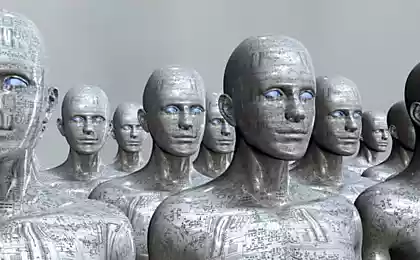554
Why it hurts the soul?
What is the soul? And as a person to understand if everything was okay with his soul? Reflects priest Stephen Freeman, a cleric of the Orthodox Church in America, rector of the Church of St. Anne in oak ridge, Tennessee, Creator of the Orthodox blog, Glory To God For All Things ("Thank God for everything"), author of numerous articles and books Everywhere Present: Christianity in a One-Storey Universe ("ever present: Christianity in a one-story universe").
Tell me – have you ever lately to hear that someone was worried: if all is in order with a soul? But probably you don't have to strain your memory to remember how you listened to the complaints of other difficulties psychological or emotional plan.

There is a difference, agree. We have become a "despiritualized" fixated on the psychological problems of their society. Ordinary early, the traditional concern for the "mental health" we now have substituted all-consuming interest in their psychological and emotional well-being.
We have become a "well-functioning" – as a mechanism – society.
And soul... she's always been something mysterious, not amenable to analysis. In Greek the word "soul" (psyche – from psykhein – "to blow, breathe") meant the life of man. The meaning of this word close to the meaning of the word "pneuma" (spirit, spirit), meaning "breath", "breath".
A body that no longer breathes, is dead. In the Book of Genesis, God it breathed life into Adam:
"And the Lord God formed man of the dust of the ground, and breathed into his face the breath of life; and man became a living soul" (Genesis 2:7).
The psychological term "self", "self" or, for simplicity, the "I" is very fashionable now concept. The classic works of Freud were written in the late 19th – early 20th centuries. His ideas were immediately picked up by pop culture, "popular psychology" after the First world war. In the "roaring twenties", the era of the return to civilian life after the horrors of the war, an epidemic of people addicted teachings of Freud. His argument that the moral and sexual taboos "dangerous and harmful", have become particularly popular. It was a decade which witnessed the first flashes of the approaching sexual revolution.
Modern from head to toe examined by psychologists, fixated on their psychological problems people are just fascinated by him. We analyze, qualify, classify, on all sides considered the smallest components of our "I".
"Work on your "I", "psychological self", "become a psychologist yourself" – such a typical expression from the Arsenal of "kitchen psychology". However, the purpose of this through "psychologizing" approach to the individual has little relationship to what is called "mental health".
Modern Christianity has picked up this perception of the world and to accommodate Scripture to modern requirements. All sorts of options "gospel of wealth" (ideology, the main message of which is God interested in the fact that people were financially secure, had good health, happy marriages, and generally live well).
Proponents of this ideology argue that people in the Bible have to be rich and wealthy. According to this doctrine, to the material prosperity leads to genuine faith, and it is a sign of God's blessing – approx. ed.) – all based on "psychologicaland" picture of the world. Even in the popular Evangelical churches it is believed that "born-again" life, life is going a person should be happier still. Christ became a means to achieve more successful in society, more satisfied, more prosperous psychologically "I".
"Psychologicaland I" includes and how we are obsessed with "success". But to say that here, they say, I become better – totally out of place in the confessional. "Is all well my heart?" – that's a much more pertinent question. And the soul must be very strong, so we can handle anger, disappointments, temptations, failures.
"Wherefore we faint not; but though our outward man perish, yet the inward day by day updated. For momentary, light affliction is producing far outweighs them all eternal glory, while we look not at what is seen, but on what is unseen. for what is seen is temporary, but what is unseen is eternal" (2 Corinthians 16:18)
The saints were not "well-balanced", "balanced" people.
"Psychologicaland I" is perfectly aligned with our consumer culture – it would be more appropriate to call it "consumer Me". When we buy something for fun, for the sake of comfort – we buy it for ourselves, so that it became as it is now considered to be "healthier". Nobody is arguing that mental suffering should be alleviated, but not at the price of our souls. The modern concept of "I" is faded substitution of the concept "soul".
And what is "soul"?
The soul is what we live. It is intangible, it seems to be dissolved in the us.
Saint Gregory of Nyssa suggested the following definition: "Soul is the substance born of, the essence of living, mental, itself informing organic and sensual body force on life and the ability to perceive sensual, until there exists a nature capable of making."
Much of what we describe as "personality", "individuality" than we are so passionately interested in and what is so hard to care – mostly just body work. The body can heal, change, it may even disappear under certain circumstances. Our memory, desires and passions, our "style of communication" – it is not our personality, not something that defines us.
For example, my brain may be prone to attention deficit disorder with hyperactivity, but to my soul it has no relation. The brain is an instrument through which the soul expresses itself (in the words of a contemporary Athonite elder), but brain activity is not the soul.
It is interesting to reflect on the experience of those who endured great torments for the faith of their observations on the nature of the soul. One such notable example – the memories of his father Roman Braga, the Romanian monk, who spent 10 years in detention in prisons under the Communist regime. There he was subjected to torture, severe psychological pressure.
He wrote: "can't you go Anywhere, you can't even look out the window in solitary confinement there are no Windows. But you still need somewhere to move. And you go deep into yourself, deep into your heart and mind. Ask yourself – who am I? why the Lord brought you into this world? Even doubt – is there a God and what my relationship with Him?
When we are free, we don't have time to question this, and our faith is superficial. Because you know a lot, and your mind can be like encyclopedias, but if you yourself don't know yourself you will not understand – even if you know everything – you only skim the surface, if not ask yourself "Why do I live?", "What is the meaning of my life?", "Why God made me?" "If I believe in God, what does He want from me?".
Such questions, especially asked by the person himself in a situation that seems hopeless, surrounded by enemies, can drive you crazy. Or, as in the case of father Roman to give the true knowledge about the soul and shed the light of true knowledge about the miracle of life granted to us.
To the question "Why do I live?" cannot be answered using only the resources of his personality. How great are the possibilities of the individual in solitary confinement?
These questions direct our attention directly to the soul. When St. Gregory wrote about the soul, he began with the apophatic approach, acknowledging from the outset that the soul belongs, as the Lord himself, to unknowable using only the mind. The question "Why do I live?" requires peace and silence.
And this silence is the best sound for the soul. The noise of mind chatter, empty chatter.
When the Holy Fathers spoke of the mind in relation to the soul, they called him "nous" (the term introduced by Plato to denote a Higher Intelligence. "Nous" is the manifestation of the divine consciousness in man – approx. ed.). The fact that this word is a synonym to the word "intelligence" is a part of the sad history of the loss of understanding of the meaning of this concept. Nous, of course, also understands and perceives, but does not like intelligence.
And it's frustrating to the modern mind, because we have to see, weigh, measure and compare. We even doubt that the soul really is, – say, maybe just called something else, for example, a certain brain function? And all we want from the heart is a sense of self – awareness, self-consciousness. Give us a selfie of the soul is undeniable and the most convincing confirmation of the existence of anything in the modern world.
Our life is something more than a simple description of metabolic processes in the cells of our bodies. the Soul, which is our life, embodies, carries the meaning and purpose of our existence. The soul was created to know God and all her attention focused on Him. It becomes clearer that this nous, the divine consciousness, when we pray sincerely, when we feel the presence of the Lord. The identity of the nous – it is in the remorse, the repentance, when we "return unto me."
Sincere repentance is not when you feel bad for what I did something wrong, a certain sadness, which may simply be our emotions. In fact, this awareness, a deep understanding that without God, distant from Him we are nothing. In the monastic tradition this is called "remembrance of death". This knowledge of the soul about its true condition. And in this state the soul yearns to return to the Lord.
Remember the words of the Great penitential Canon of Andrew of Crete, who sing at the beginning of Lent, turning our attention to this: "my Soul, my soul, rise up that sleep? The end is coming, and imashi satirise: o DRC, but will spare thee Christ our God, everywhere present and all ispolnyayu".
The soul is our life, this is literally the anchor of our existence.
"I the consumer" is ill-suited for true existence. Should such an "I" encounter with the impossibility of choice, as the inherent narcissism makes "consumer I" in despair. People in the modern world often make purchases to get a little "mute" depression.
But our true being is the soul. Only in the soul are inevitable in our world of pain, suffering, and sickness make sense. "Consumer I" can't stand suffering and clinging to any false hope, promising freedom from suffering.
But hear again the father of the Novel: "Suffering is useful not only for Christians but for every human being. If you don't know suffering you don't know anything". This from a man who was imprisoned by the regime, which Solzhenitsyn described as "the worst barbarism of the modern world".
The Lord Himself explicitly States that salvation involves suffering. He told those who would follow Him must "take up your cross". And He spoke not about the wide road on which to go for self, but about the narrow path, where uncials own will, it's the proverbial "I" and achieved full obedience to the perfect will of the Lord.
The modern world is a soul lost. Fortunately, the world is always ready to provide us as many pain and suffering and thus give us a chance to find her again.
Wake up, rise up, my soul.published
Priest Stephen Freeman
Translation Of Anna Barabash
P. S. And remember, just changing your mind — together we change the world! ©
Join us in Facebook , Vkontakte, Odnoklassniki
Source: www.pravmir.ru/chto-takoe-dusha-ili-kogda-psihologiya-bessilna/
Tell me – have you ever lately to hear that someone was worried: if all is in order with a soul? But probably you don't have to strain your memory to remember how you listened to the complaints of other difficulties psychological or emotional plan.

There is a difference, agree. We have become a "despiritualized" fixated on the psychological problems of their society. Ordinary early, the traditional concern for the "mental health" we now have substituted all-consuming interest in their psychological and emotional well-being.
We have become a "well-functioning" – as a mechanism – society.
And soul... she's always been something mysterious, not amenable to analysis. In Greek the word "soul" (psyche – from psykhein – "to blow, breathe") meant the life of man. The meaning of this word close to the meaning of the word "pneuma" (spirit, spirit), meaning "breath", "breath".
A body that no longer breathes, is dead. In the Book of Genesis, God it breathed life into Adam:
"And the Lord God formed man of the dust of the ground, and breathed into his face the breath of life; and man became a living soul" (Genesis 2:7).
The psychological term "self", "self" or, for simplicity, the "I" is very fashionable now concept. The classic works of Freud were written in the late 19th – early 20th centuries. His ideas were immediately picked up by pop culture, "popular psychology" after the First world war. In the "roaring twenties", the era of the return to civilian life after the horrors of the war, an epidemic of people addicted teachings of Freud. His argument that the moral and sexual taboos "dangerous and harmful", have become particularly popular. It was a decade which witnessed the first flashes of the approaching sexual revolution.
Modern from head to toe examined by psychologists, fixated on their psychological problems people are just fascinated by him. We analyze, qualify, classify, on all sides considered the smallest components of our "I".
"Work on your "I", "psychological self", "become a psychologist yourself" – such a typical expression from the Arsenal of "kitchen psychology". However, the purpose of this through "psychologizing" approach to the individual has little relationship to what is called "mental health".
Modern Christianity has picked up this perception of the world and to accommodate Scripture to modern requirements. All sorts of options "gospel of wealth" (ideology, the main message of which is God interested in the fact that people were financially secure, had good health, happy marriages, and generally live well).
Proponents of this ideology argue that people in the Bible have to be rich and wealthy. According to this doctrine, to the material prosperity leads to genuine faith, and it is a sign of God's blessing – approx. ed.) – all based on "psychologicaland" picture of the world. Even in the popular Evangelical churches it is believed that "born-again" life, life is going a person should be happier still. Christ became a means to achieve more successful in society, more satisfied, more prosperous psychologically "I".
"Psychologicaland I" includes and how we are obsessed with "success". But to say that here, they say, I become better – totally out of place in the confessional. "Is all well my heart?" – that's a much more pertinent question. And the soul must be very strong, so we can handle anger, disappointments, temptations, failures.
"Wherefore we faint not; but though our outward man perish, yet the inward day by day updated. For momentary, light affliction is producing far outweighs them all eternal glory, while we look not at what is seen, but on what is unseen. for what is seen is temporary, but what is unseen is eternal" (2 Corinthians 16:18)
The saints were not "well-balanced", "balanced" people.
"Psychologicaland I" is perfectly aligned with our consumer culture – it would be more appropriate to call it "consumer Me". When we buy something for fun, for the sake of comfort – we buy it for ourselves, so that it became as it is now considered to be "healthier". Nobody is arguing that mental suffering should be alleviated, but not at the price of our souls. The modern concept of "I" is faded substitution of the concept "soul".
And what is "soul"?
The soul is what we live. It is intangible, it seems to be dissolved in the us.
Saint Gregory of Nyssa suggested the following definition: "Soul is the substance born of, the essence of living, mental, itself informing organic and sensual body force on life and the ability to perceive sensual, until there exists a nature capable of making."
Much of what we describe as "personality", "individuality" than we are so passionately interested in and what is so hard to care – mostly just body work. The body can heal, change, it may even disappear under certain circumstances. Our memory, desires and passions, our "style of communication" – it is not our personality, not something that defines us.
For example, my brain may be prone to attention deficit disorder with hyperactivity, but to my soul it has no relation. The brain is an instrument through which the soul expresses itself (in the words of a contemporary Athonite elder), but brain activity is not the soul.
It is interesting to reflect on the experience of those who endured great torments for the faith of their observations on the nature of the soul. One such notable example – the memories of his father Roman Braga, the Romanian monk, who spent 10 years in detention in prisons under the Communist regime. There he was subjected to torture, severe psychological pressure.
He wrote: "can't you go Anywhere, you can't even look out the window in solitary confinement there are no Windows. But you still need somewhere to move. And you go deep into yourself, deep into your heart and mind. Ask yourself – who am I? why the Lord brought you into this world? Even doubt – is there a God and what my relationship with Him?
When we are free, we don't have time to question this, and our faith is superficial. Because you know a lot, and your mind can be like encyclopedias, but if you yourself don't know yourself you will not understand – even if you know everything – you only skim the surface, if not ask yourself "Why do I live?", "What is the meaning of my life?", "Why God made me?" "If I believe in God, what does He want from me?".
Such questions, especially asked by the person himself in a situation that seems hopeless, surrounded by enemies, can drive you crazy. Or, as in the case of father Roman to give the true knowledge about the soul and shed the light of true knowledge about the miracle of life granted to us.
To the question "Why do I live?" cannot be answered using only the resources of his personality. How great are the possibilities of the individual in solitary confinement?
These questions direct our attention directly to the soul. When St. Gregory wrote about the soul, he began with the apophatic approach, acknowledging from the outset that the soul belongs, as the Lord himself, to unknowable using only the mind. The question "Why do I live?" requires peace and silence.
And this silence is the best sound for the soul. The noise of mind chatter, empty chatter.
When the Holy Fathers spoke of the mind in relation to the soul, they called him "nous" (the term introduced by Plato to denote a Higher Intelligence. "Nous" is the manifestation of the divine consciousness in man – approx. ed.). The fact that this word is a synonym to the word "intelligence" is a part of the sad history of the loss of understanding of the meaning of this concept. Nous, of course, also understands and perceives, but does not like intelligence.
And it's frustrating to the modern mind, because we have to see, weigh, measure and compare. We even doubt that the soul really is, – say, maybe just called something else, for example, a certain brain function? And all we want from the heart is a sense of self – awareness, self-consciousness. Give us a selfie of the soul is undeniable and the most convincing confirmation of the existence of anything in the modern world.
Our life is something more than a simple description of metabolic processes in the cells of our bodies. the Soul, which is our life, embodies, carries the meaning and purpose of our existence. The soul was created to know God and all her attention focused on Him. It becomes clearer that this nous, the divine consciousness, when we pray sincerely, when we feel the presence of the Lord. The identity of the nous – it is in the remorse, the repentance, when we "return unto me."
Sincere repentance is not when you feel bad for what I did something wrong, a certain sadness, which may simply be our emotions. In fact, this awareness, a deep understanding that without God, distant from Him we are nothing. In the monastic tradition this is called "remembrance of death". This knowledge of the soul about its true condition. And in this state the soul yearns to return to the Lord.
Remember the words of the Great penitential Canon of Andrew of Crete, who sing at the beginning of Lent, turning our attention to this: "my Soul, my soul, rise up that sleep? The end is coming, and imashi satirise: o DRC, but will spare thee Christ our God, everywhere present and all ispolnyayu".
The soul is our life, this is literally the anchor of our existence.
"I the consumer" is ill-suited for true existence. Should such an "I" encounter with the impossibility of choice, as the inherent narcissism makes "consumer I" in despair. People in the modern world often make purchases to get a little "mute" depression.
But our true being is the soul. Only in the soul are inevitable in our world of pain, suffering, and sickness make sense. "Consumer I" can't stand suffering and clinging to any false hope, promising freedom from suffering.
But hear again the father of the Novel: "Suffering is useful not only for Christians but for every human being. If you don't know suffering you don't know anything". This from a man who was imprisoned by the regime, which Solzhenitsyn described as "the worst barbarism of the modern world".
The Lord Himself explicitly States that salvation involves suffering. He told those who would follow Him must "take up your cross". And He spoke not about the wide road on which to go for self, but about the narrow path, where uncials own will, it's the proverbial "I" and achieved full obedience to the perfect will of the Lord.
The modern world is a soul lost. Fortunately, the world is always ready to provide us as many pain and suffering and thus give us a chance to find her again.
Wake up, rise up, my soul.published
Priest Stephen Freeman
Translation Of Anna Barabash
P. S. And remember, just changing your mind — together we change the world! ©
Join us in Facebook , Vkontakte, Odnoklassniki
Source: www.pravmir.ru/chto-takoe-dusha-ili-kogda-psihologiya-bessilna/























